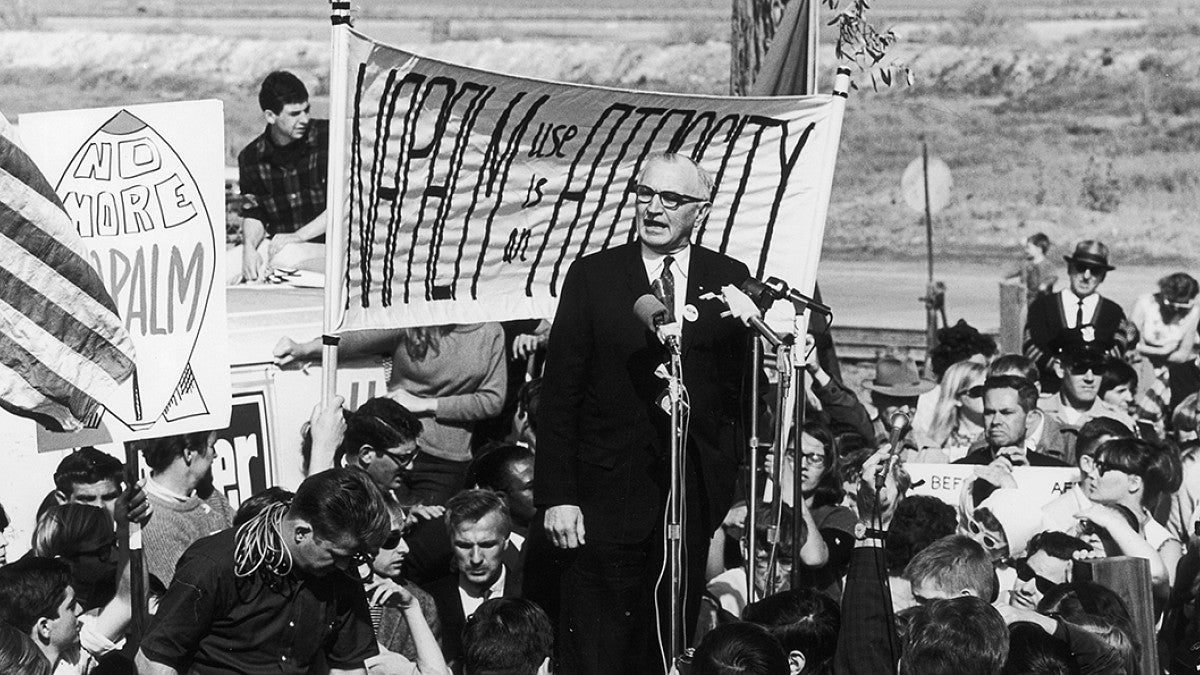
Senator Morse was staunchly opposed to communism, even approving the use of military force to repel it when necessary. But during Eisenhower’s presidency, Morse’s political attacks fell both on his colleagues in the Senate for allowing engagement in conflicts of questionable merit, and on the Eisenhower administration for pursuing such an aggressive military policy. With each new intervention, Morse’s fear of a major confrontation with China or Russia grew deeper. Morse’s foes called for the use of military force as a “preventative” measure against the fall of countries to communist rule. This logic would pave the way to America’s undeclared war in Vietnam.
The Gulf of Tonkin Resolution has become one of the most debated topics in U.S. post-war foreign policy. The resolution allowed President Johnson to engage U.S. troops without a formal declaration of war, in response to an alleged attack on a U.S. ship as it patrolled the foreign waters of the Gulf of Tonkin. The apparent attack on U.S. forces threw even the most reluctant members of Congress into a defensive position.
Nevertheless, Morse joined Senator Ernest Gruening of Alaska in voting against the Gulf of Tonkin Resolution. Senator Morse formally opposed the resolution on constitutional grounds, declaring that Article I of the Constitution would be violated if Congress surrendered its authority to check the President’s power. The Constitution establishes the President as commander-in-chief of the armed forces, but to balance and check this power the Constitution invests Congress with the power to declare war.
When the resolution passed, Morse declared that Congress had surrendered its authority, and therefore the authority of the people it was elected to serve. Morse also deplored the open-ended nature of the approval and condemned Congress for giving the President and the military a “blank check” which would be cashed with taxpayer’s money and citizens’ lives.
Throughout the war, Senator Morse took great issue with the Johnson administration’s deceptive practices, including the withholding of information from the public. At a protest rally on the Yale campus, Morse declared:
“I don’t think you have any idea of the power that you exercise on issues before the Congress. My plea is we’ve got to think of the future…your future, and we’ve got to come to grips with the issues that are going to confront your generation.”
Morse eventually paid the political price for his outspoken dissent. Robert Packwood went on to use it in his 1968 campaign against the incumbent senator. Packwood declared that Morse’s opposition to continued funding of military action in Vietnam was reckless, because such restriction would cut off military support for soldiers without ending the war or finding a solution to the conflict.
Packwood also took Senator Morse to task for letting his opposition to the war sidetrack him from the real concerns of citizens—timber exports, how much they got back in taxes, and other “bread and butter” issues. Packwood sums up these priorities during an interview in The Last Angry Man: “All politics is local. Forget [Morse’s] position on Vietnam! Could he deliver for the state?” Packwood won the campaign. Morse passed away six years later on July, 22, 1974, in the midst of a campaign to recapture his Senate seat.
